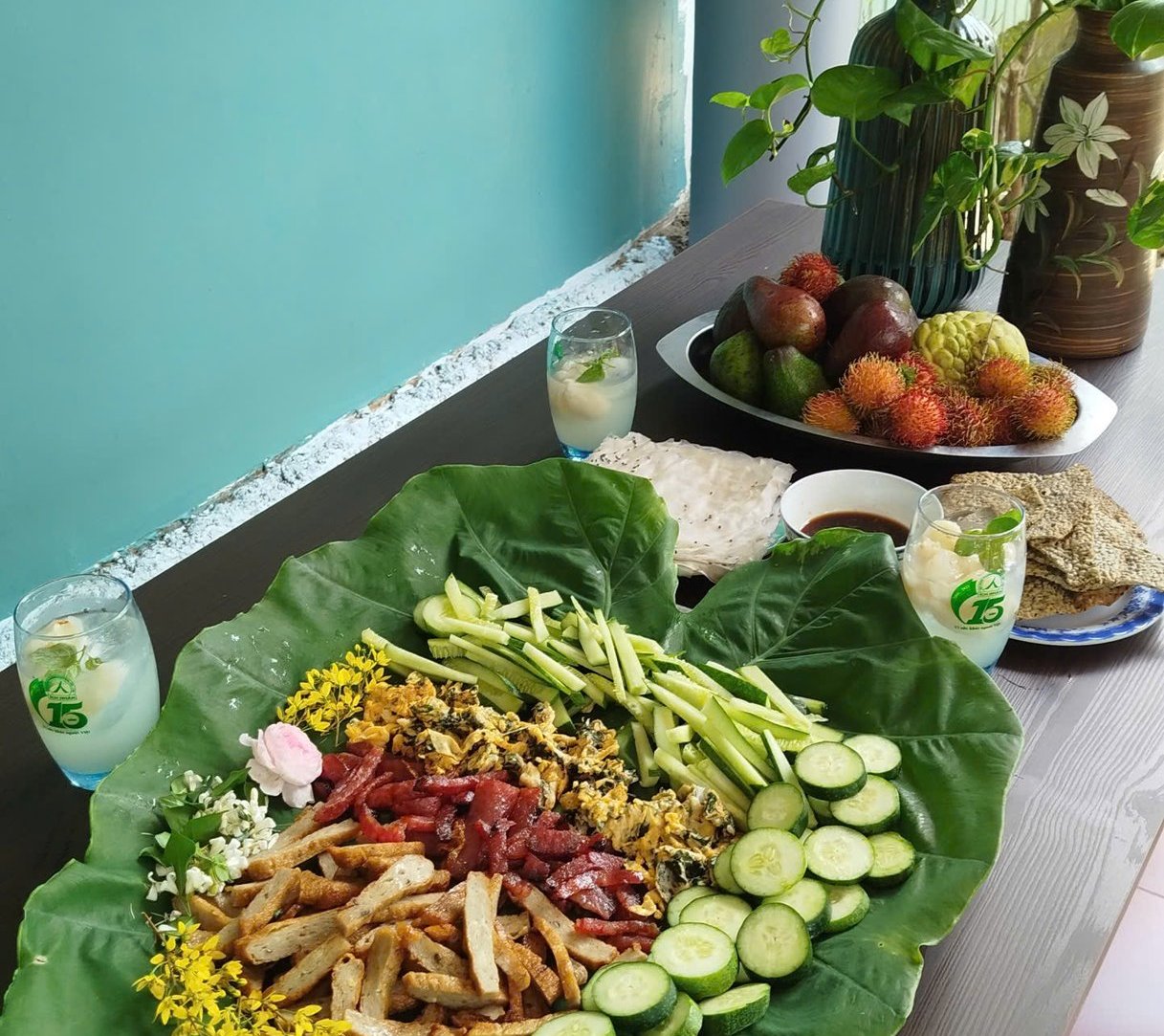Vietnamese Cuisine
The Vietnamese culinary art is extremely sophisticated based on the philosophy of Yin Yang - Five Elements. In eating, Vietnamese people pay special attention to three aspects.
DCT
9/14/20254 phút đọc


The Vietnamese culinary art is extremely sophisticated based on the philosophy of Yin Yang - Five Elements. In eating, Vietnamese people pay special attention to three aspects:
1. Ensuring the harmony of Yin and Yang in food
2. Ensuring the balance of Yin and Yang in the body
3. Ensuring the balance of Yin and Yang between humans and the natural environment.
4. Ensuring the harmony of Yin and Yang in food
First, ensuring the harmony of Yin and Yang in food.
To create dishes with a balance of Yin and Yang, Vietnamese people distinguish five levels of Yin and Yang in food according to the Five Elements, including:
1. Cold (cold, more Yin, water element)
2. Hot (hot, more Yang, fire element)
3. Warm (warm, less Yang, wood element)
4. Cool (cool, less Yin, metal element),
5. Neutral (neutral, earth element).
When preparing food, it is necessary to strictly follow the law of yin and yang compensation and transformation when combining foods, spices and ingredients together to create dishes with a balance of yin and yang, water and fire. Only then will the food be healthy and delicious. For example: Vietnamese coriander is hot (yang) and eaten with fertilized eggs which are cold (yin) is delicious and easy to digest. Or ginger is a hot (yang) spice that has the effect of clearing colds and relieving colds. When cooked with foods such as fish, mustard greens (braised fish, mustard green soup) which are cold foods, it is very fragrant and delicious.
- Second, ensure the balance of yin and yang in the body.
Vietnamese people use food as medicine to treat diseases. According to the concept of Vietnamese people, all diseases are caused by the body losing its yin and yang balance, food is the medicine to adjust that imbalance of yin and yang, helping the body recover from disease. Therefore, if a sick person is sick due to too much yin, they need to eat yang food (cold stomachache, drink ginger water to get well); on the contrary, if a sick person is sick due to too much yang, they need to eat yin food (dysentery, eat fried chicken eggs with perilla leaves)...
- Third, ensure the balance of yin and yang between people and the environment.
Vietnamese people have eating habits according to the climate and season. For example, in hot summer (heat - fire element), they should eat cold, cool, watery (yin - water element), sour (yin) foods which are easy to eat, easy to digest, and cooling. In cold winter (cold - yin), they should eat dry, fatty (yang) foods, such as stir-fried, fried, braised dishes... In food processing, it is necessary to ensure enough five nutrients including: starch, water, minerals, protein, fat; enough five flavors including: sour, spicy, sweet, salty, bitter; enough five colors including: white, green, yellow, red, black.
To strengthen the bond between husband and wife, to live together for life, on the wedding day, people also make round Susê cakes (a mispronunciation of phu the - husband and wife) wrapped in a square mold (yang in yin). The cake has white coconut flesh, yellow bean filling, sprinkled with black sesame, green leaf mold, tied with red string - that is the symbol of the Yin Yang - Five Elements philosophy, symbolizing the completeness and harmony of heaven and earth and people.
In the way of eating, you must eat with all five senses. The nose smells the aroma of the food; the eyes see the harmonious colors of the food being displayed; the tongue tastes the deliciousness of the food; the ears hear the crispy sound of the food; the hands touch and tear the food (there are types of food that must be eaten with the hands to be delicious... imagine holding a chicken thigh, dipping it in salt, lemon and chili, bringing it to the mouth to tear it... the feeling of eating will be much more delicious when cutting the chicken thigh into pieces, using chopsticks to eat).
Vietnamese people believe: "Eat while watching the pot, sit while watching the direction", eating and drinking must be thoughtful and moderate, which is a manifestation of the balance of yin and yang while eating. A polite eater should not eat too fast or too slow, should not eat too much or too little, should not eat all or should not eat anything left. Why is that? Eating too fast is hasty and rude, on the contrary, eating too slowly forces the person eating with you to sit and wait, both are impolite ways of eating. Eating all or eating too much is greedy, eating all the other person's portion. On the contrary, eating anything left or eating little is criticizing the host's food as not delicious. Therefore, when eating, you must try to eat deliciously to show gratitude and respect for the host, and you must leave some food on the dishes to show that you are not greedy.
A delicious meal is a synthesis of the deliciousness of all factors: Delicious food is not delicious when eaten in the wrong weather; sitting in the wrong place is not delicious; eating without a happy atmosphere is not delicious; especially delicious food without close friends is not delicious. During meals, ancient Vietnamese people did not drink beer, nor did they drink “Western wine”, “Western wine” is suitable for people in cold countries. Vietnamese food must be served with Vietnamese wine made from sticky rice to be delicious.
